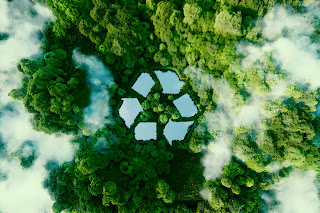Recycling And Waste Management: Towards A Sustainable Future.
Recycling and Waste Management are crucial for protecting the environment and ensuring sustainable resource usage. As the world population expands, so does the amount of waste we produce. Effective waste management systems lessen the environmental impact of garbage by encouraging recycling, composting, and responsible disposal techniques.

Recycling is the conversion of waste resources into new products. It helps to conserve natural resources, reduce pollution, and reduce the amount of energy needed for manufacturing. Paper, plastic, glass, and metals are among the most commonly recycled items. Recycling reduces the demand for raw materials, which helps to reduce greenhouse gas emissions from their extraction, transportation, and processing.
Waste management includes more than just recycling. It entails collecting, transporting, treating, and disposing of garbage in the most environmentally friendly way possible. Effective waste management solutions may reduce pollution, protect ecosystems, and save landfill space. Modern waste management strategies also stress the necessity of decreasing trash at its source, reusing products whenever possible, and handling hazardous chemicals properly.
Organic waste, such as food scraps and garden clippings, is diverted into composting programs, which is an important element of waste management. Composting converts organic matter into nutrient-dense soil that can be utilised to improve plants and landscapes. This procedure not only minimises the amount of garbage that goes to landfills, but it also improves soil health and reduces the need for artificial fertilisers.
Proper waste segregation is essential for successful recycling and composting initiatives. Individuals and businesses alike are encouraged to sort their garbage into appropriate bins, such as recyclables, compostables, and non-recyclables. Educational programs and public awareness campaigns can also assist to promote a culture of responsible waste management, allowing communities to play an active role in decreasing their environmental effect.
The benefits of recycling and trash management are extensive. By adopting these behaviours, we can save resources, reduce pollution, and lessen the effects of climate change. Furthermore, many governments and organisations provide incentives for recycling, such as reduced garbage collection fees or money awards for returning certain goods such as bottles and cans.
Investing in strong recycling and waste management systems is critical to creating a sustainable future. These initiatives not only protect the earth for future gerations, but they also generate economic opportunities by creating jobs in areas such as recycling, waste collecting, and material processing.
In conclusion, Recycling and Waste Management are critical in the fight against environmental degradation. Responsible waste management allows us to dramatically minimise our environmental footprint, conserve resources, and create a cleaner, healthier planet. Every simple action, such as recycling a plastic bottle or composting food scraps, contributes to a greater, collaborative effort to protect our planet.


Comments
Post a Comment